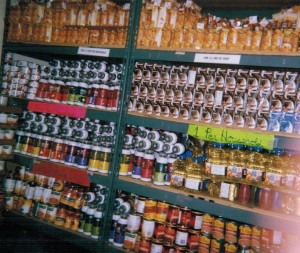The Monks are Going, Going, Gone
They came in quietly, unannounced, a couple of years ago on the 10:05 Trailways bus from Boston. Eighteen monks in all. They were transferred out of a lovely monastery in Brookline, Massachusetts, these priests who traditionally never move at all.
They left quietly these last few weeks, unannounced. They’re moving to a brand new monastery north of Albany. Funny how these things happen. I get the feeling that God is grinning from ear to ear.
We met them because, when they showed up in Woodstock they were temporarily hungry. The story was slow to surface and I wrote about it earlier in this blog and on the Good Morning Woodstock Blog . They shopped at the Good Neighbor Food Pantry until they got their budget straightened out. Once we found them, Peggy made sure they didn’t lack for anything if the pantry had anything to do with it.
In a very short time, weeks, they were delivering food to the home bound on Tuesday mornings with the other pantry volunteers. They filled out an application to be a food pantry with the Food Bank of the Hudson Valley. And, finally, they were attending our mass distributions.
Within a few short months they had their own food pantry going and were serving food to the hungry seven days a week.
Without saying a word, these men of the cloth showed us all how to feed the hungry. They didn’t skimp. They made as many food runs to Albany as they needed. They offered whatever food they had to anyone who needed it.
Then, when I went out and helped open the Reservoir Food Pantry, they made sure we never lacked for yogurt. Every time the pantry opened we had a freezer filled for our hungry.
I mean, these priests showed us all how to feed the hungry. They didn’t offer a three-day-supply of food to someone with the understanding that it needed to last seven days. They didn’t spend a lot of time focusing on questions about where people lived. It didn’t matter whether a person was homeless or not.
When the hungry pulled away from the Holy Assumption Monastery Food Pantry, they had enough food to not only feed the body but the soul.
So now, the priests, who traditionally never leave a monastery and move to another monastery, are packing up their gorgeous beeswax candle factory, their Food Bank ID number, and moving off to a community which really needs their skills, their dedication, their belief system.
Frankly, I was devastated when I heard the news. I went out to visit and write the story. I couldn’t do it.
I sat, visited, and kept asking myself “How can this happen?” The answer is easy, folks. They are being asked to take their skills and expertise to Schoharie County where no one is going to question the ethics of feeding the hungry.
And, I take comfort in the fact that we have not been abandoned in Woodstock. We have been taught our lesson. So…now the monastery is being converted into a convent.
These gorgeous men of God are taking their smiles, their radiant halos, their worship, and their food pantry skills to Cobbleskill, New York and they will press on with their daily lives.
The good nuns will have a pantry in Bearsville for our hungry. I understand they’ve already got their own Food Bank ID number. God is making sure we don’t forget what we learned.
Thank you for reading this blog/book.
Please refer this article to your preferred social media network.
Thurman Greco
Take $1 – Leave $1
The young musician’s sign said it all:
TAKE $1
LEAVE $1
She sat on the sidewalk in front of Houst the other day, with her guitar box open. True to Woodstock tradition, she was singing for tips. Her sign, her posture, her music really resonated with me. I really feel that we are now fast approaching the point in our country where our residents are divided into two groups:
those who use pantries, soup kitchens
those who do not use pantries, soup kitchens
So, that puts us in the Take $1 – Leave $1 lifestyle.
Food pantries and soup kitchens, through the food distribution process work relentlessly to end hunger. Most people working in pantries or soup kitchens are volunteers who understand they offer hope and sustenance to a community of people living with and affected by hunger and, in some cases, homelessness.
Any amount you can spare will help make the pantry or soup kitchen you support a better place. Please send a donation today. Your gift will make a difference in the lives of people who have little and need a lot. Take $1 – Leave $1
Thank you in advance for your generosity.
Thurman Greco
Thank you for reading this blog. The story is true. The people are real.
Please refer this article to your preferred social media network.
Don’t forget to join the email list.
5 Important Things You Need to Know About SNAP
“Hunger and income inequality is probably the single biggest issue facing this country.” – Susan Zimet
When you use SNAP, you don’t just get much needed food for your household. When you use SNAP, you create a ripple effect of money for your community. You can use your SNAP card with pride knowing how your purchases will benefit your area.
Here’s how it works: SNAP is federal money. When you use your SNAP card at a local supermarket, you bring it into your community. The grocer uses the money to benefit the local grocery store. This purchase strengthens local businesses.
Are you in a household with senior/disabled members? If so, you may still qualify for SNAP even if you have a higher income. SNAP works for individuals, couples, and families.
Are you paying mandated child support? If so, this money you use to pay child support is not counted toward your income.
You can work and still qualify for SNAP, stretching your food budget every month. When you use SNAP, you more easily afford the nutritious foods you and your family need.
You can shop at a food pantry and still qualify for SNAP.
SNAP can be an important addition to you and your household budget. Apply for this benefit today to help yourself, your household, and your community. How cool is that?
Thanks for reading this blog.
The story is true. The people are real.
Don’t forget to join the email list.
Please refer this article to your preferred social media network and to anyone you know you may benefit from SNAP but is not using it.
Thurman Greco
My Story and the 9 Truths I Discovered
I began my life changing journey fighting hunger on a cool autumn Thursday in Woodstock, New York in 2005 where I volunteered for the first time at the local food pantry.
I was assigned a shift with Marie Duane. I drove over to the Woodstock Reformed Church, parked my car behind the buildling and cautiously walked in. I had never been to the pantry before.
I entered the empty hallway and found the pantry on the right. I walked into the room and there it was: a small space, actually, about 12′ by 16′. Each wall supported a set of metal shelving units. Each unit stood about 6′ high and 3′ deep with 4 shelves. Most of the shelves were empty. A few shelves had some food:
cereal
tuna
soup
peanut butter.
There was a little handwritten note in front of each display:
person: 1 item, family: 1 item.
There may have been other items on shelves but I don’t remember them.
A small table stood in the center of the room. A metal folding chair was placed in front of each window.
We sat in the chairs, Marie and I, and chatted as people trickled in. We discussed the usual: weather, gardening, knitting, decorating the alter at St. Gregory’s Episcopal Church.
“Hi. How are you? Will you please sign your name here?” Each shopper signed in and noted the number of adults, seniors, and children in the household. After signing in, the person walked around the room selecting from the cereal, peanut butter, tuna, and soup. The selected food was placed on the table and bagged to take home, wherever or whatever that was.
On this morning, not blessed with any psychic knowledge, I was totally unaware of experiences waiting for me in the pantry. Never in my wildest thoughts did I envision the hall filled with hungry people, the tiny room packed with fresh produce and jammed with shoppers.
Nor did I for 1 moment ponder the push back I would experience as the number of hungry seeking food grew. Within a few short years, this 2 dozen single homeless men – mostly Woodstock’s colorful characters – had swelled (due to a tanking economy) to over 300 people weekly. This number finally approached 500 people weekly before it was all over.
Now, in the autumn of 2015, our stock market experiences numerous “corrections”. I realize I learned some things over the years which, for me, are ground truths about the pantry.
Feeding the hungry with dignity is the most important thing.
Single homeless men are now far outnumbered by members of the Struggling Class, households of working people holding down 2 and 3 jobs just to pay the rent and buy the gas to get to work.
The 3 most hot button words in the English language are food, sex, and money. These 3 words are concerned with a person’s core beliefs, emotions, and spiritual attitudes. Food and money, or the lack thereof, loom large in pantries.
The sidewalks in our communities and cities have become wards of untreated mentally ill people. In our great nation we don’t hospitalize or otherwise treat many of our mentally ill. Instead, they they are incarcerated.
Some of these untreated mentally ill happen to be homeless. Homeless is not a category of people. It’s just a situation that happens. It can happen to anyone.
The 50+ senior population has many who lack enough $$$ for food and are largely a silent group. The bottom line is this: When our grandparents don’t get enough to eat, they often get sick.
I’m seeing a whole generation of children who have never been inside a grocery store.
Shoppers at our pantry can get a 3-day supply of food weekly. Their job is to make it last 7 days. Many share this food with a pet. Often, the only thing a person has left from a prosperous past is the dog.
The most difficult thing I see in the pantry is a Korean War vet getting food. Something I just can’t understand is how a person who served in a very brutal war, and subsequently spent an adult life working and paying taxes should have to be in a food pantry line in his old age.
Much of the food available to the hungry in food pantries is diverted from its trip to the landfill.
There is absolutely no excuse for anyone in our great nation to go hungry.
Thank you for reading this blog. The story is true. The people are real.
Please refer this article to your preferred social media network. Share this story with friends or relatives who might be interested.
Don’t forget to join the email list.
Thurman Greco
Breakfast in the Classroom? 8 Reasons why it’s Important
1. Children learn better. Studies show children who eat breakfast in the classroom score better at math, reading tests. Breakfast helps students pay attention to the teacher. Their memory is improved. Children behave better if they are not hungry.
2. Breakfast in the classroom helps fight childhood obesity. School meals follow nutritional guidelines. Breakfast is more nutritious than it might otherwise be.
3. Not all children eat before coming to school. They may not have an appetite when they first wake up. There may not be nutritious food in the home. They may be too busy to eat. That means they lack the energy and nutrients they need to perform at their best throughout the day.
4. Breakfast in the classroom results in better attendance. Children living in households where breakfast is not available are tardy less often and spend less time in the nurse’s office when they receive breakfast in the classroom.
5. A consistently served nutritional breakfast in the classroom develops healthy eating habits throughout life. Children who eat breakfast in the classroom have a better nutritional intake than those who don’t. These are habits which can be carried into adulthood.
6. When breakfast is served in the classroom, every student participates. There are no obstacles such as bus schedules, cafeteria location, social stigma. This fosters a sense of community, something badly needed for children growing up in food insecure households.
7. Breakfast in the classroom is not a lot of work. A well planned breakfast program only takes about 15 minutes and can be part of routine activities. The whole project can be a collaborative effort operated by the food service staff, the and the teacher. This will build a sense of community.
8. Breakfast in the classroom decreases the risk of food insecurity. Breakfast in the classroom is important for the student who doesn’t have enough food to eat in the home.
Thank you for reading this blog.
I’ll be publishing articles on this blog less frequently while I’m preparing my reflexology book for publication. Thanks in advance for your patience.
Please refer this article to your preferred social media network.
Don’t forget to join the email list..
Thurman Greco
Writers’ Boot Camp Inspiration
I’ve been inspired by the Writers’ Boot Camp experience to knuckle down and finish the reflexology book…AT LAST!
So, I’ll be posting on the hunger/food pantry blog every other week for the next few weeks. I hope you are not inconvenienced by this.
Thank you for your patience and your support.
Thank you for reading this blog.
Please refer this article to your preferred social media network.
Don’t forget to join the email list.
Thurman
http://www.reflexologyforthespirit.com
http://www.goodmorningwoodstock.com
















